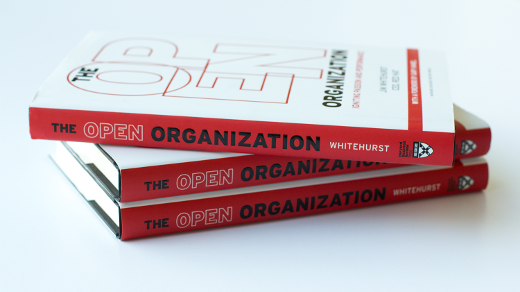When the Opensource.com team invited me to lead this week's book club, I was excited to dive into the chapter on meritocracy: the concept that good ideas can come from anywhere, and the best ideas should win.
Meritocracy is an appealing yet surprisingly complex topic. I'm a big proponent because I've experienced its power firsthand in my own career at Red Hat. But I'm also not oblivious to the fact that the word "meritocracy" has gotten a bad rap in the business world lately, chiefly because organizations have offered it as an explanation for their lack of diversity. (Fortunately, plenty of smart people have already explained why diversity is a critical ingredient of a thriving meritocracy.)
This week, we'll be exploring meritocracy's potential benefits to organizations, as well as examining some of its limits. So let's get started.
Discussion (Chapter 4: Choosing Meritocracy, Not Democracy)
In the book club this week, we'll be discussing "Chapter 4: Choosing Meritocracy, Not Democracy."
There are many thought-provoking moments in chapter 4 of The Open Organization, and I found myself nodding along as I read this description of how meritocracy operates at Red Hat:
Our engineers earn influence with each other based on their contributions to the code. But the same principle applies to all associates in the organization, regardless of what department they work in or what their day-to-day job entails. Everyone has the ability to earn influence and get his or her ideas heard. It simply relates to how effective you are at presenting and getting people behind your ideas, throughout the organization. (p. 92)
Elsewhere in the chapter, Jim explains that meritocracy means having the kind of culture and tools that give everyone the chance to make their voices heard. Meritocracy demands that decision-makers open their ears to not simply the loudest voices, but also to the ones that carry the most sway. Meritocracy requires leaders in particular to have the humility and confidence to remain open to influence and outside perspectives.
At the same time, he acknowledges that even in a meritocracy, not everyone will be listened to equally. Building credibility takes time and effort, and a newcomer (for example) is unlikely to have the same degree of influence as someone who has already earned the trust and respect of peers and leaders. It won't always seem fair and, indeed, one drawback to this approach is that some good ideas are probably never really considered.
Nevertheless, the book contends, a culture of meritocracy is still lightyears ahead of conventional, hierarchical systems.
So now it's your turn. What's your take on meritocracy? Here are a few questions I'd love to hear your thoughts on:
- Have you ever worked in an environment where the best ideas often won? How did it impact your desire to contribute?
- What actions can a manager take to encourage meritocracy? How about a junior team member? A more senior contributor?
- When everyone is sharing ideas, what role should attribution and giving credit play?
- What are some things people do that inadvertently shut down or short-circuit a meritocratic environment?
- Which do you think happens more often: a single great idea gets adopted, or multiple ideas converge to form something great?
- Who gets to decide whether an idea is a good one? Are there objective ways of making that call?
- How does bringing together groups of people with very different backgrounds and ways of thinking contribute to a meritocracy?
- What are some effective ways to encourage others to voice their ideas—particularly those who are hesitant to do so? What are some benefits to inviting quieter or more reluctant individuals to participate?






4 Comments